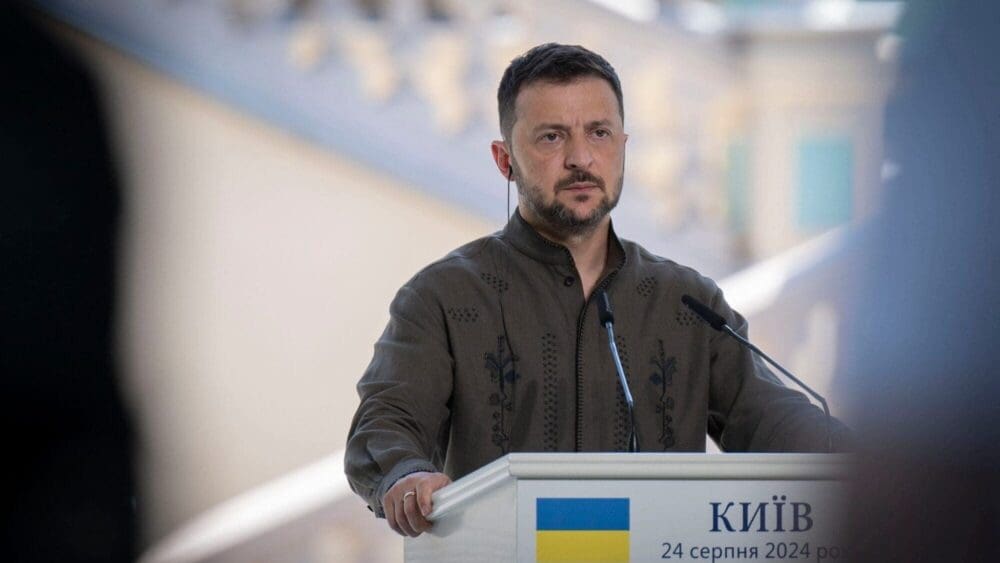
Ukrainian President Volodymyr Zelensky
Володимир Зеленський/Facebook, August 2024
What was considered a taboo to suggest just a year ago—trying to find a diplomatic conclusion to the war in Ukraine rather than liberating all the occupied territories through military means—is now Kyiv’s main strategy, with a concrete plan already in place, President Zelensky announced on Tuesday, August 27th.
Zelensky said he is preparing to present his terms for peace negotiations with Russia to his main allies to ask for their support—including President Biden and both his potential successors, Donald Trump and Kamala Harris—but only as long as Western powers do not pressure Ukraine into accepting an unjust settlement to end the war sooner.
Talking at a press conference in Kyiv, the Ukrainian president revealed that his country’s ongoing offensive inside the Russian region of Kursk had been one of the core elements of his plan, meant to put Kyiv in a stronger position to negotiate from and increase internal pressure on the Kremlin, “forcing” Russia to end the war.
During the three-week-old offensive, Ukraine has captured over a thousand square kilometers inside Russia along with nearly a hundred settlements and taken around 600 prisoners of war to swap for Ukrainian prisoners captured elsewhere along the frontlines. The first of these POW swaps was conducted last weekend when the two countries exchanged a total of 230 troops between them. Similarly, a withdrawal from the occupied Russian areas could be put forward during negotiations to persuade Russia to abandon at least part of its territorial claims in eastern Ukraine.
Zelensky did not elaborate further on the next steps—and he will not at least until he has discussed the plans with President Biden on the sidelines of September’s UN General Assembly in New York. He added that he would like to talk with Vice President Harris and President Trump sometime before the U.S. elections in early November “because we don’t know who will be the president of the United States,” but no concrete timing was revealed.
Talking about prospective peace talks, Zelensky believes the next international peace summit— preferably organized somewhere in the Middle East in November—will bring a major breakthrough but only if Russia can be persuaded to send representatives. Russian officials had repeatedly stated their readiness to negotiate before the Ukrainian incursion began on August 6th, but now claim the talks are “impossible” due to the “provocation” in Kursk.
While Russia is now reluctant to sit down and talk, it did not attend the previous peace conference organized in Switzerland in June not because it did not want to, but because it was not invited in the first place, leading to several countries, including China, to boycott the event.
This time, however, Kyiv is fully prepared to enlist as many global powers to mediate as possible. The Ukrainian foreign minister traveled to Beijing a few weeks ago for the first time to ask for the Xi government’s diplomatic intervention, while Indian PM Narendra Modi called Putin after his visit to Kyiv last week and told him of his support for an early and peaceful resolution to the conflict.
All these efforts follow the playbook of Hungarian PM Viktor Orbán, who had been condemned by other Western leaders for conducting preliminary talks with all relevant parties to gauge the interest in (and conditions for) peace. Orbán suggested three simple steps—reestablishing diplomatic ties with Russia, involving China as a mediator, and reclaiming the respect of the global South (for example by organizing the talks in the third world)—that were considered heresy just months ago.
Now with more chips on the table, Ukraine is ready to talk but Russia is not—Zelensky says this is because Putin is unable to accept that he would have to make a settlement that is not beneficial to him alone. “Dialogue today is in principle empty and meaningless because [Putin] does not want to end the war diplomatically,” Zelensky said.
Previously, President Putin said any compromise will have to be based on accepting the “realities on the ground,” meaning Ukraine’s losing position on the battlefield. Now, even if Russian troops continue to advance in the Donbas, the Kursk offensive fundamentally changes this prerogative, Zelensky pointed out, as far fewer countries are calling for Ukraine to give up territories occupied by Russia.
“The main point of this plan [that will be discussed with the U.S. leaders] is to force Russia to end the war” in a way that’s “fair to Ukraine,” Zelensky stated.
